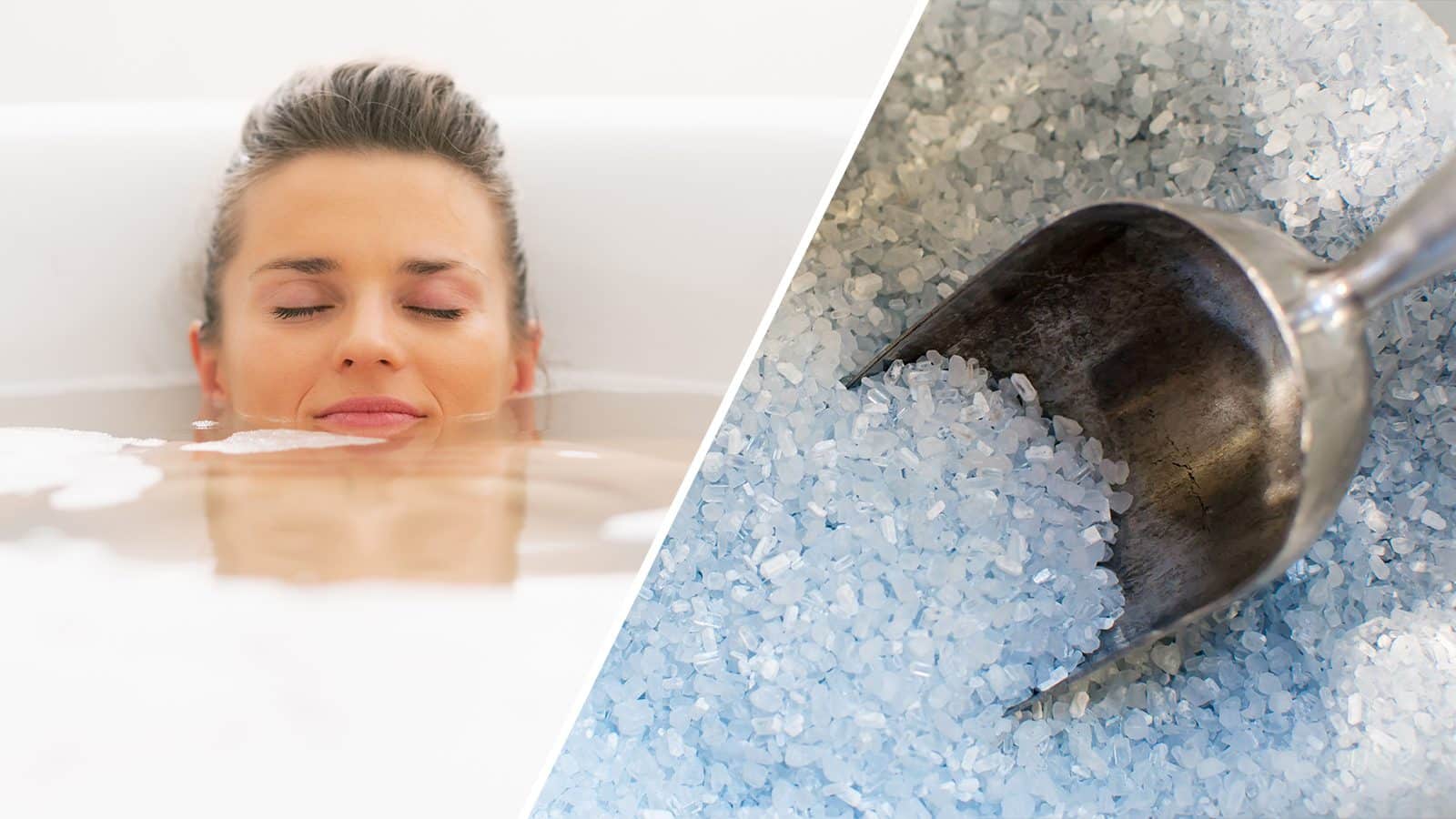After a long, stressful day of work or school, nothing feels better than an Epsom salt bath. This unique natural remedy can help you relax and unwind from your day, allowing your worries to drift away. Hot bath water and Epsom salts can facilitate the healing of sore muscles and bodily pains. Most people add about two cups to their bathwater and soak for at least thirty minutes to reap the most benefits. As the “salts” dissolve in the water, they release magnesium and sulfate ions that help reduce inflammation and remove toxins from the body.
People have been using Epsom salts for centuries to treat various conditions, such as constipation, electrolyte imbalances, and stress. Many now utilize it worldwide for healing anxiety, muscle aches, dry skin, and magnesium deficiencies. Below, health and wellness experts provide insights into the benefits and effects on the body when taking Epsom salt baths.
Understanding Epsom Salt
Epsom salt, or magnesium sulfate, consists of magnesium, sulfur, and oxygen. Despite the name, it’s not salt but only resembles it due to its chemical structure. Its name originates from the bitter saline spring in Epsom in Surrey, England. The mineral compounds found in Epsom salt have significant benefits for the mind and body, including stress reduction and muscle relaxation.
Some proponents of this natural remedy suggest that Epsom salt composition can even help with nutrient deficiencies since it contains magnesium. However, other scientists have debunked this claim, explaining that the body cannot absorb magnesium through the skin. Nonetheless, it can promote relaxation. It also supports healing muscle after workouts, among other benefits. Some people even utilize Epsom salts in their beauty routines, as it’s an excellent exfoliant and hair conditioner.
Epsom Salt Bath and Muscle Relaxation
One of the most common reasons people take Epsom salt baths is because it aids in muscle relaxation. After a challenging workout at the gym, the first thing you probably feel like doing is soaking in a hot bath or shower. Since Epsom salts reduce inflammation, adding them to your bathwater will help soothe aches and relieve muscle tension. Many people attribute the increased relaxation they experience to the magnesium in Epsom salts, but no studies have confirmed this. It’s more likely that the warm water soothes muscle aches. However, research shows that magnesium supplements can enhance exercise performance and recovery.
Stress Reduction
Epsom salt baths have also become popular because they reduce stress and promote relaxation. Research from the University of North Carolina discovered that magnesium deficiency can increase stress and anxiety levels. However, another study found that adequate magnesium intake can restore one’s neurochemical balance and lower cortisol. Even though magnesium absorption through the skin isn’t possible, a hot bath can still reduce stress. Taking magnesium supplements along with salt baths can also enhance this effect.
Skin Detoxification and Exfoliation
Many people report healing effects on their skin health from taking Epsom salt baths in recent years. While no studies support these findings, anecdotal evidence suggests magnesium sulfate can aid skin detoxification and exfoliation. To use it for this purpose, combine about 1/2 tsp of Epsom salt with water or your favorite facial scrub. Rub it in and allow the mixture to sit briefly before rinsing it off.
Take an Epsom Salt Bath for Improved Sleep and Relaxation
Since insomnia and other sleep disorders have reached epidemic proportions, taking an Epsom salt bath could provide the relief you seek. The magnesium in Epsom salt can promote improved sleep since it induces relaxation and lowers stress. Studies show that increasing magnesium intake can regulate circadian rhythm and positively impact sleep quality. While you can take Epsom salts orally, it’s not recommended since magnesium sulfate is poorly absorbed. Instead, experts suggest taking magnesium citrate or glycerinate since these forms are more bioavailable. But check with your primary care physician or pharmacist before you start any supplementation program.
Relieving Constipation
Another critical benefit of Epsom salt baths includes their ability to improve digestive health. The FDA lists Epsom salt as an approved laxative for short-term use. Studies show that magnesium sulfate can increase water volume in the intestines, which helps rapidly remove toxins from the colon. If you want to use it for relieving constipation, experts recommend mixing one serving with a glass of water. However, some people may experience unpleasant side effects such as bloating, diarrhea, or abdominal pain, so it’s not recommended as a permanent solution.
Reducing Pain and Swelling
In addition, many people love Epsom salt because it helps relieve swelling, pain, and inflammation. The anti-inflammatory effects are believed to derive from magnesium, as the mineral is widely known for pain reduction. Studies show that low magnesium levels cause increased C-reactive protein (CRP), a key marker of inflammation in the body. Therefore, taking magnesium supplements or Epsom salt baths can help with swelling reduction and ease pain.
Boosting Magnesium Levels
As mentioned above, Epsom salt can increase magnesium absorption and restore the body’s mineral balance. The mineral regulates muscle and nerve function, balances blood sugar, and aids energy production. However, if you want to boost magnesium levels, try a more bioavailable form, such as magnesium citrate. Research shows that Epsom salt isn’t absorbed well in the digestive tract, even when taken orally. No matter which form of magnesium you take, be mindful of the serving size since a magnesium overdose can cause heart problems and digestive issues.
Take an Epsom Salt Bath to Improve Foot Health
Finally, an Epsom salt bath can enhance your foot health since it helps relax swollen, sore feet. There’s nothing like a rejuvenating foot soak after a draining workday to reduce stress levels. Anecdotal evidence also suggests that Epsom salt could help treat fungal infections, though no studies support this claim. But, since a magnesium sulfate soak keeps your feet clean and healthy, it makes sense that this would ward off infections.
Final Thoughts on Enjoying an Epsom Salt Bath for Healing
You can enjoy numerous benefits of an Epsom salt bath, such as increased muscle relaxation and better skin health. Many people find Epsom salt helpful in healing stress and tension and improving their sleep quality. Also, orally taking Epsom salt can boost magnesium levels and relieve constipation. You’ll notice numerous body changes with Epsom salt baths, such as a more relaxed nervous system and youthful skin. The health implications of Epsom salt usage shouldn’t be overlooked, as this ancient remedy can benefit both the body and mind. However, consult your doctor before starting this treatment, especially if you take other medications or supplements.





















